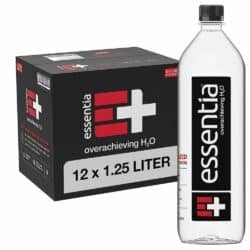Is Propel Water Bad for You? A Nutritionist Answers
In this blog post, I’ll review the question of whether Propel Water is good or bad for you? Find out what this product’s nutrition pros and cons are, plus some better options to consider. For most people, Propel Water is not considered healthy as it contains artificial sweeteners and preservatives. Try drinking regular water, coconut water, or make your own sports drink without chemicals.

Propel Water Facts
Propel Water is a lightly flavored sports drink designed to replenish electrolytes in athletes and other active people. The Gatorade Company, which PepsiCo owns, created Propel Water in a lab.
Propel Water is available in liquid and powder form, and there is an “immune support” line and an unflavored version which is only available for purchase in the online store. However, most of the ingredients are the same in both the liquid and powder forms.
Although it includes some basic ingredients like water and salt, it also has some highly processed ingredients to be aware of, like sodium hexametaphosphate, potassium sorbate, calcium disodium EDTA, Acesulfame Potassium, and Sucralose.
Most of these additives are chemically formulated in a lab environment – they don’t occur naturally, so they can’t be considered real food.
Propel Water Ingredients
Here is a list of the typical ingredients found in Propel Water electrolyte drinks (unflavored and flavored varieties):
Unflavored Propel Water:
- Water
- Potassium Sorbate (preservative)
- Sodium Hexametaphosphate (to protect flavor)
- Calcium Disodium EDTA (to protect freshness)
Flavored Propel Water (e.g., berry, grape, kiwi strawberry):
- Water
- Natural Flavors
- Citric Acid (for tartness)
- Sodium Hexametaphosphate (to protect flavor)
- Potassium Sorbate (preservative)
- Sodium Citrate (to control acidity)
- Sucralose (sweetener)
- Acesulfame Potassium (sweetener)
- Calcium Disodium EDTA (to protect freshness)
- Vitamin C (ascorbic acid)
- Vitamin E Acetate
- Niacinamide (Vitamin B3)
- Calcium Pantothenate (Vitamin B5)
- Pyridoxine Hydrochloride (Vitamin B6)
Different flavors may have slight variations in their ingredients.
Here is some more information about some of the major ingredients listed on the nutrition label so you can determine if Propel fitness water is good for you or not.
Additionally, you may want to be aware of potential side effects from drinking this type of electrolyte drink.
Potassium Sorbate

The label states that this chemical is added to preserve freshness. Regulatory agencies like the FDA classified Potassium Sorbate as “generally safe,” and it does not accumulate in the body.
However, the European Food Safety Authority strictly limits the acceptable daily intake of this chemical.
It has been loosely linked to allergic reactions, especially on the skin and scalp, and there is a concern that Potassium Sorbate may be cross-contaminated with dangerous substances like lead, mercury, and arsenic.
Sodium Hexametaphosphate
According to the Propel Water label, the manufacturers add sodium hexametaphosphate to protect the product’s flavor.
Although studies have indicated its safety when consumed in minimal amounts, there are strict guidelines around the quantities of sodium hexametaphosphate allowed in food.
These regulations may have come about because consuming large quantities of the chemical has been linked to an increased risk of pancreatic cancer. Further studies are required around this, but it’s worth considering that it may be a risk.
Studies like this have also associated Sodium Hexametaphosphate with allergic reactions, headaches, an increase in kidney size, bone decalcification, and other health concerns.
Acesulfame Potassium
Acesulfame Potassium is another name for Acesulfame K – an artificial sweetener that is as much as 200 times sweeter than sugar but has an unpleasant, bitter aftertaste. Because of this, manufacturers tend to use it with other artificial sweeteners like Aspartame or Sucralose.
Acesulfame Potassium is easily absorbed and secreted in the same state, which means that it has no nutritional benefits for the body.
The FDA approved Acesulfame Potassium as a food additive, but only in small quantities. This, and other inconclusive studies, have caused controversy in the general belief that this additive is safe for human consumption.
Some studies recommend further research to determine whether it has health risks, including the possibility that it may cause cancer because it contains methylene chloride, a widely known carcinogen.
Sucralose

Sucralose is an artificial sweetener.
It is highly processed and chlorinated; the human body can’t metabolize it. Even though the FDA has approved it as a food additive, some associated health concerns exist. Many health-conscious people choose to avoid this additive.
Compared to sugar, Sucralose is around 600 times sweeter, so you won’t need to use a lot of it to sweeten drinks or food.
However, long-term consumption of this additive can cause all kinds of health problems. It can cause toxicity and inflammation and help cause obesity and diabetes. Sucralose also reduces good gut bacteria, which harms your body’s gut microbiome and can cause digestive issues.
If you decide to have foods and drinks that contain this ingredient, it’s best to do so in moderation and to avoid long-term use to avoid potential health issues.
Calcium Disodium EDTA
Calcium Disodium EDTA is added to foods to protect flavor and in some medical applications. Manufacturers make it by combining sodium cyanide, formaldehyde, and ethylene diamine.
In the medical world, Calcium Disodium EDTA is a chelating agent, which means that it binds heavy metals in your body to be expelled. It is used to treat lead poisoning. Unfortunately, this is only sometimes good because we need some metals in our bodies.
It can also interact with other medications like steroids such as cortisone or prednisone, certain antibiotics, blood thinning medications, insulin with zinc, and zinc salts. Furthermore, Calcium Disodium EDTA can cause digestive distress and headaches, and lower blood sugar.
Long-term consumption can lead to toxicity and kidney damage. People with kidney problems should avoid it altogether.
Nutrition Pros
Propel Water has no added sugar, no trans fats, no saturated fats, no cholesterol, and zero calories. It is caffeine-free, gluten-free, and dairy-free and does not contain any of the major allergens.
Consuming an electrolyte drink over sugary drinks like soda or sugary sports drinks may be a healthier option which may reduce heart disease and benefit blood sugar levels.
Some of the nutrients in Propel Water are potassium, vitamin C, vitamin E, and B vitamins. It can help replenish water, potassium, and sodium lost during vigorous physical activity.
There may be other cases of electrolyte imbalance when healthy electrolytes are important over plain water. But, you could easily make your own electrolyte water from tap water without any chemicals.
Or, try drinking coconut water which has zero sugar and essential electrolytes such as potassium. Coconut water is a caffeine-free sports drink that may be the best choice of all the energy drinks. Try my Coconut Pineapple Water recipe or my Cucumber Ginger Water!
You might also like my related blog post, “Is Fresca Good For You?“
Nutrition Cons
Although Propel Water can help replenish electrolytes lost by sweating, it’s important to be conscious of what else is going into your body when you drink this beverage. It contains several controversial ingredients that health-conscious people may not want to consume.
Propel Water is also packaged in plastic. Even though it is recyclable, the recycling process comes with its own carbon footprint, and only some people choose to recycle.
Lastly, some people may have negative responses from consuming vitamin B, especially if you drink too much Propel water in one day with an active lifestyle.
People with kidney disease also may need to be careful when consuming vitamin water which have potassium citrate or other forms of potassium.
Propel Water Video Review
FAQs
Propel Water may be better for you than some choices of sports drinks, but it contains unhealthy ingredients you may want to avoid in your diet. If you’re active and need more electrolytes, choosing real food ingredients and making a sports drink at home is always best. It’s also cheaper to make your own flavored water with simple ingredients like a squeeze of fresh lemon and a pinch of sea salt.
Yes, Propel Water contains electrolytes, so it can help with hydration. It’s important to note that it also has other ingredients that are not generally considered healthy or that have health benefits.
Although Propel Water contains no calories or added sugar, it contains controversial artificial sweeteners with potential health implications that could lead to weight gain instead of weight loss.
Although there are no specific health warnings, care should be taken when giving this drink to children. Propel Water contains chemicals and artificial sweeteners that may cause adverse health effects.
Check Out These Energy Drink Reviews Too!
Conclusions
Propel Water contains electrolytes and some other healthy ingredients. It is free from trans fats, added sugar, caffeine, gluten, and dairy. Although it can help you replenish electrolytes if you’re exercising, this drink also contains many unhealthy ingredients, including artificial sweeteners and chemical ingredients that are not good for your body.
If you decide to drink it, exercise caution and only have it in moderation. Or, better yet, make your own sports drink at home with real food ingredients.
Don’t forget to join my newsletter list to get exclusive clean eating recipes and tips. The newsletter is 100% free with no spam; unsubscribe anytime.
About the Author: Carrie Forrest has a master’s degree in public health with a specialty in nutrition and is studying to be a holistic nutritionist. She is a top wellness and food blogger with over 5 million annual visitors to her site. Carrie has an incredible story of recovery from chronic illness and is passionate about helping other women transform their health. Send her a message through her contact form.
Note: this post is for informational purposes only and is not intended as medical advice. Please consult your healthcare provider for recommendations related to your individual situation.





















I have drank diet sprite for years. . I believe it’s hurting my joints. wou!d propel do the same thing?
Have used Propel powder, about 8 packs per day, for almost a year. I am not aware of any side effects but your article causes some concern. Even with this amount of Propel, I still had severe muscle cramps, enough to wake me up at night. I started adding Himalayan sea salt to my water and the muscle cramps went away. I may need the extra salt because I don’t add any salt to my food.
Can you recommend a good electrolyte that is safe? I don’t feel like I need a lot of other minerals as I take a daily vitamin plus magnesium supplements and eat a banana
Thanks for any feedback..
I use a keto electrolyte supplement from Designs for Health but I see that it was just discontinued. I would search on Amazon for a quality electrolyte supplement that doesn’t have any weird ingredients or sweeteners.
What is considered too much Propel consumption in a day? You talk about that; but, do not specify what that is?
I would say one serving size per day max would be appropriate for an adult with no pre-existing health issues that might react to the ingredients.